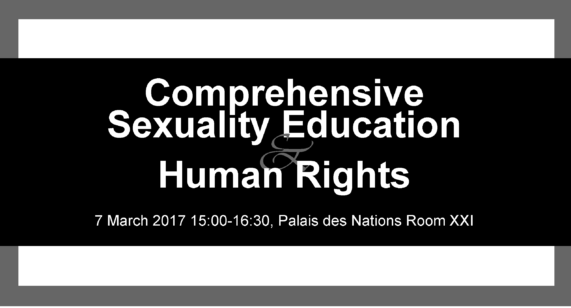HRC34 Panel Highlights: Comprehensive Sexuality Education & Human Rights

The SRI organized a side event on the margins of session 34 of the Human Rights Council to highlight the role of human rights to comprehensive sexuality education (CSE) in achieving the Sustainable Development Goals (SDGs). The event was held alongside the annual Day of Discussion on the Rights of the Child and negotiations on a resolution on the Rights of the Child in the context of the SDGs. A diverse panel of speakers representing States, UN agencies and youth-led organizations delivered insights on the current political, social and factual context of CSE, the need to address deeply entrenched gender norms that stigmatize young people’s sexuality, and solutions that support young people in realizing their human rights, including their right to CSE.
Highlights from the event
- Meghan Doherty from Action Canada for Sexual Health and Rights and the SRI opened the discussion by setting the human rights context for CSE. She highlighted regional political agreements, particularly in GRULAC and Eastern and Southern Africa and acknowledged that all States struggle with balancing their obligations to children’s rights to special protection with their obligations to develop policies that support adolescents’ evolving capacities to claim their sexual and reproductive rights. She asked panelists how we can all do better to meet their needs.
- Deputy High Commissioner for Human Rights, Kate Gilmore, painted a picture of the lives of adolescents around the world. She referenced high rates of unsafe abortion, HIV transmission, FGM, early and forced marriage, and sexual violence affecting adolescents and stressed that deprivation of essential sexual and reproductive health services, information and education constitutes a human rights violation. She noted that with the largest generation of young people in human history, there is a strategic urgency to fulfilling adolescents’ sexual and reproductive rights and there can be no excuses for their continued neglect. CSE provides a pathway to participation in society and States have a duty to ensure that all children, adolescents and young people are equipped with the knowledge and skills to do so.
- Ms. Benedicte Storm, Youth Advisor to the Permanent Mission of the Kingdom of Denmark in Geneva, discussed the purpose and meaning of youth participation in the achievement of the SDGs, particularly as it relates to sexual and reproductive health and rights. She shared her experiences as the Mission’s first ever youth advisor, the Danish Government’s commitment to take forward its plans to operationalize youth empowerment within the respective ministries and as part of external policies, and why this is particularly important for sexual and reproductive health and rights.
- Ms. Nomtika Mjwana from the Sexual and Reproductive Justice Coalition presented on the scope and delivery of CSE in South Africa and her observations as a recent graduate student on CSE. Ms. Mjwana explained that while the legal and policy environment for CSE was exceptional in South Africa, the implementation fell well short of international best practice. Issues of victim blaming, heteronormativity, stigmatization of adolescent sexuality and a focus on disease prevention were prominent throughout the curricula. Notably absent were modules on communication, decision making, gender equality and the recognition that adolescents have sex for pleasure. Ms. Mjwana concluded by setting out a series of recommendations to improve the delivery of CSE including: inclusive and realistic messaging that relates to lived experiences of young people; sex positive content; content that is not heteronormative/patriarchal or violent; capacity building for teachers and healthcare workers; and actively engaging young people on CSE content.
- Dr. V. Chandra-Mouli, Scientist on adolescent sexual and reproductive health from the WHO Department of Reproductive Health and Research, gave a lively presentation on the evidence-base in support of CSE and busted several myths regarding the purpose, content and outcomes of CSE delivery. Using the example of menstruation, Dr. Chandra-Mouli explained that many girls lack basic understanding of their body, its functions and how to care for themselves both mentally and physically. By not providing quality CSE, we are failing children and adolescents at school, at home and in the community. He talked about the value of CSE in promoting gender equality, human rights and more equitable societies. Dr. Chandra-Mouli concluded by outlining the key aspects of CSE delivery that have been proven to be effective and rights-affirming.